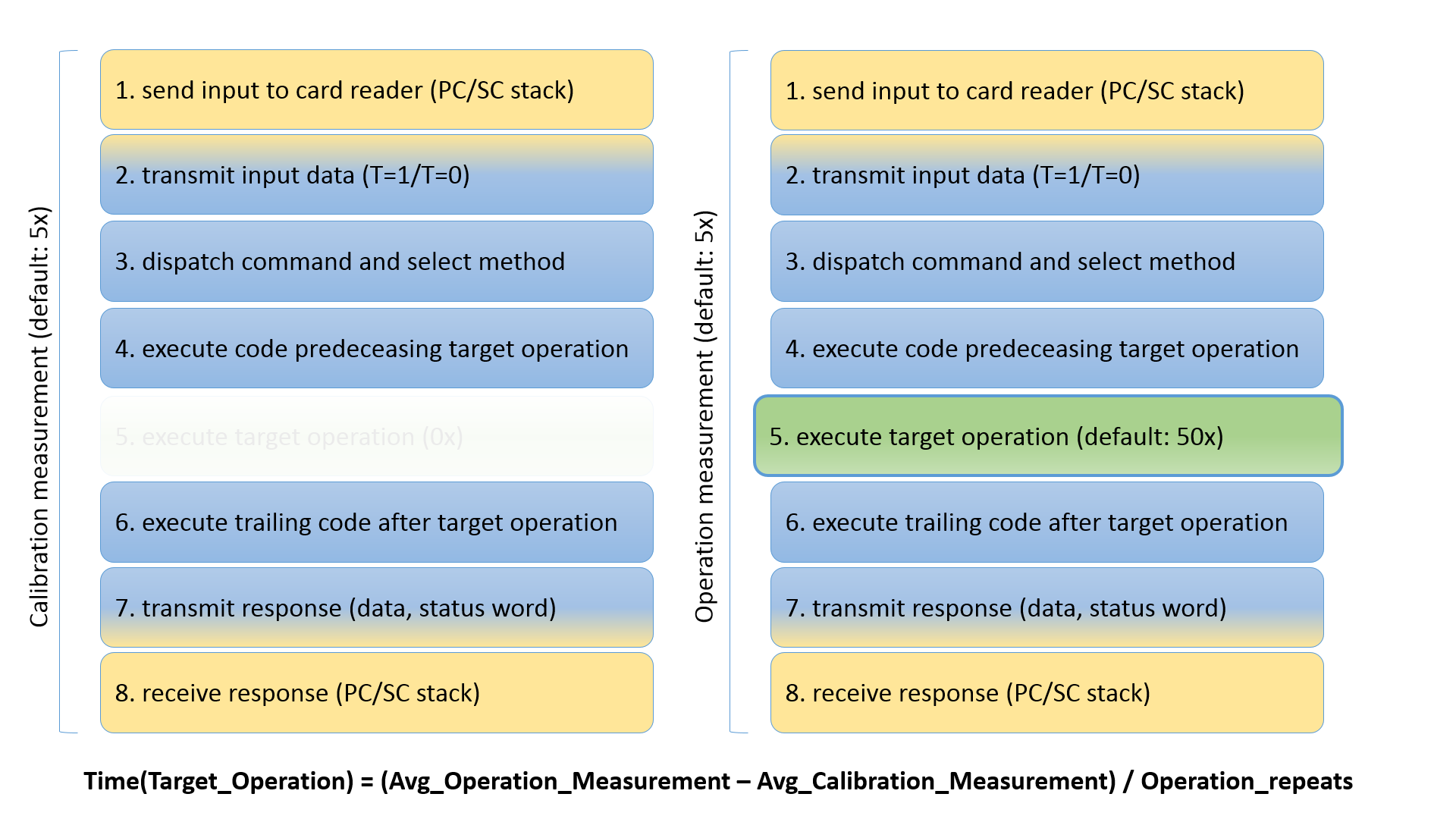-
Notifications
You must be signed in to change notification settings - Fork 44
Performance testing methodology
Important: work in progress!
Goal: Measure time (ms) of selected operation running on card (e.g., AESKey.setKey()). Problem: Selected operation cannot be measured directly (e.g., elapsed = timeEnd - timeStart) because of missing on-card timer and protected environment of smart card (no possibility to time start and end of operation inside surrounding code). As a result, one can only measure overall time between send of input data that will trigger operation (PC/SC SCardTransmit() ) on host system.
This measurement then includes time to:
- send input to card reader (PC/SC stack)
- transmit input data (T=1/T=0)
- dispatch command and select on-card method (process())
- execute code predeceasing target operation
- execute target operation
- execute trailing code after target operation
- transmit response (dataOut, status word, (T=1/T=0))
- receive response (PC/SC stack)
Additionally, target operation usually takes only small fraction of measurement with majority taken by operations we like to exclude from measurement (~one ms vs. ~tens of ms). Situation is additionally worsen by possible non-determistic time fluctuations on a host side.
Note: Measurement fluctuations on host side can be mitigated if simpler host architecture is available (e.g., microcontroller-based card reader).
Note: Very precise measurement of elapsed time can be obtained from a power trace, if start and end of selected operation can be identified. Such a measurement requires access to setup with osciloscope and significant time for identification of target operation. We verified selected operation using this method.
Note: Some operations cannot be meaningfully measured without additional operation executed together (e.g., setKey before target operation Cipher.init). We measure both operations together and then substract time for additional operation.
Note: We intentionally did not exclude outlayer measurements as it may contain interesting information regarding non-deterministic behaviour of a card

Measurement procedure:
- start/stop time measured on host
- repetitions on host with same data (5x, NUM_REPEAT_WHOLE_MEASUREMENT, 10x NUM_REPEAT_WHOLE_MEASUREMENT_KEYPAIRGEN)
- default length of data for on-card operation (256B)
- length of variable data for on-card operation (16-512B)
- repetitions of target operation on card (fixed length => 50x NUM_REPEAT_WHOLE_OPERATION, variable length => 5x (to keep overall running time reasonable))
- perftest_measure method (outer):
- check if not already measured before
- try perftest_measure - catch exception, try again, then ask for user intervention (physical remove of card, reupload of applet)
- perftest_measure method (innner):
- for every repetitions of measurement prepare fresh set of objects on card and reset it (prepare_class_XXX, APDU, not measured)
- Measure processing time without actually calling measured operation (achieved by setting 0 to number of repetitions; testSet.numRepeatWholeOperation set to 0) - repeat 5x NUM_BASELINE_CALIBRATION_RUNS
- ResetApplet (APDU, not measured)
- PerfTestCommand
- => baseline avg time
- Measure target operation (testSet.numRepeatWholeOperation = 50x fro fixed data or 5x for variable data):
- ResetApplet (APDU, not measured)
- PerfTestCommand => time
- measurement time = time - baseline avg time
- => min, max, avg measurement time
- prepare_class_XXX (on-card)
- allocate new objects required for testing target operation
- erase or set RAM/EEPROM arrays into default values
- perftest_class_XXX (on-card)
- receive apdu data
- parse incoming settings (num_repeats, data length...)
- switch (algorithm type)
- initializations done only once before for(num_repeats)
- for(num_repeats)
- target operation
- (optional) alternate between two different objects to prevent (too quick) use of existing one when card actually decides not to execute operation as the object is still same (e.g., Cipher.init())
- end, send apdu out